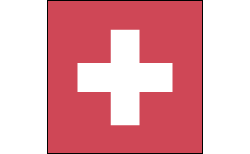Switzerland
 National name: Schweiz/Suisse/Svizzera/Svizra President: Pascal Couchepin (2008) Land area: 15,355 sq mi (39,769 sq km); total area: 15,942 sq mi (41,290 sq km) Population (2007 est.): 7,554,661 (growth rate: 0.4%); birth rate: 9.7/1000; infant mortality rate: 4.3/1000; life expectancy: 80.6; density per sq mi: 492 Capital (2003 est.): Bern, 122,700 Largest cities: Zurich, 971,800 (metro. area), 348,100 (city proper); Geneva, 178,900; Basel, 162,800; Lausanne, 117,400 Monetary unit: Swiss franc Languages: German 64%, French 20%, Italian 7% (all official); Romansch 0.5% (national) Ethnicity/race: German 65%, French 18%, Italian 10%, Romansch 1%, other 6% Religions: Roman Catholic 42%, Protestant 35%, Orthodox 2%, Muslim 4%, none 11% (2000) Literacy rate: 99% (1980 est.) Economic summary: GDP/PPP (2005 est.): $264.1 billion; per capita $35,300. Real growth rate: 1.8%. Inflation: 1.2%. Unemployment: 3.8%. Arable land: 10%. Agriculture: grains, fruits, vegetables; meat, eggs. Labor force: 3.8 million; services 69%, industry 26%, agriculture 5% (1998). Industries: machinery, chemicals, watches, textiles, precision instruments. Natural resources: hydropower potential, timber, salt. Exports: $148.6 billion f.o.b. (2005 est.): machinery, chemicals, metals, watches, agricultural products. Imports: $135 billion f.o.b. (2005 est.): machinery, chemicals, vehicles, metals; agricultural products, textiles. Major trading partners: Germany, U.S., France, Italy, UK, Spain, Netherlands, Austria (2004). Communications: Telephones: main lines in use: 4.82 million (1998); mobile cellular: 1.967 million (1999). Radio broadcast stations: AM 4, FM 113 (plus many low power stations), shortwave 2 (1998). Radios: 7.1 million (1997). Television broadcast stations: 115 (plus 1,919 repeaters) (1995). Televisions: 3.31 million (1997). Internet Service Providers (ISPs): 44 (Switzerland and Liechtenstein) (2000). Internet users: 3.85 million (2002). Transportation: Railways: total: 4,511 km (2002). Highways: total: 71,011 km; paved: 71,011 km (including 1,638 km of expressways); unpaved: 0 km (2000). Waterways: 65 km; Rhine (Basel to Rheinfelden, Schaffhausen to Bodensee); 12 navigable lakes. Ports and harbors: Basel. Airports: 66 (2002). International disputes: none. |
Geography
Switzerland, in central Europe, is the land of the Alps. Its tallest peak is the Dufourspitze at 15,203 ft (4,634 m) on the Swiss side of the Italian border, one of 10 summits of the Monte Rosa massif. The tallest peak in all of the Alps, Mont Blanc (15,771 ft; 4,807 m), is actually in France. Most of Switzerland is composed of a mountainous plateau bordered by the great bulk of the Alps on the south and by the Jura Mountains on the northwest. The country's largest lakes—Geneva, Constance (Bodensee), and Maggiore—straddle the French, German-Austrian, and Italian borders, respectively. The Rhine, navigable from Basel to the North Sea, is the principal inland waterway.
Government
Federal republic.
History
Called Helvetia in ancient times, Switzerland in 1291 was a league of cantons in the Holy Roman Empire. Fashioned around the nucleus of three German forest districts of Schwyz, Uri, and Unterwalden, the Swiss Confederation slowly added new cantons. In 1648 the Treaty of Westphalia gave Switzerland its independence from the Holy Roman Empire.
French revolutionary troops occupied the country in 1798 and named it the Helvetic Republic, but Napoléon in 1803 restored its federal government. By 1815, the French- and Italian-speaking peoples of Switzerland had been granted political equality.
In 1815, the Congress of Vienna guaranteed the neutrality and recognized the independence of Switzerland. In the revolutionary period of 1847, the Catholic cantons seceded and organized a separate union called the Sonderbund, but they were defeated and rejoined the federation.
In 1848, the new Swiss constitution established a union modeled on that of the U.S. The federal constitution of 1874 established a strong central government while giving large powers of control to each canton. National unity and political conservatism grew as the country prospered from its neutrality. Its banking system became the world's leading repository for international accounts.
Strict neutrality was its policy in both world wars. Geneva was the seat of the League of Nations (later the European headquarters of the United Nations) and of a number of international organizations.
Allegations in the 1990s concerning secret assets of Jewish Holocaust victims deposited in Swiss banks led to international criticism and the establishment of a fund to reimburse the victims and their families.
Surprisingly, women were not given the right to vote or to hold office until 1971. Switzerland's first woman president—as well as the first Jew to assume the position—was Ruth Dreifuss in 1999.
In Sept. 2000, the Swiss voted against a plan to cut the number of foreigners in the country to 18% of the population (in 2000 foreigners made up 19.3%). Since 1970, four similar anti-immigration plans have failed.
On Sept 10, 2002, the Swiss abandoned their long-held neutrality to become the 190th member of the UN.
In Oct. 2003, Switzerland took a turn to the right when the far-right Swiss People's Party (SVP) had the strongest showing in parliamentary elections, garnering 28% of the vote. Its virulently anti-immigration, anti-EU leader, Christopher Blocher, was given a cabinet position. The SVP fared well again in October 2007 elections, winning 29% of the vote and gaining seven seats in Parliament. The party took the most votes in general election history. Immigration dominated the election, and the SVP was accused of running a racist campaign. In December, the coalition that has run Switzerland since 1959 fell apart when the SVP withdrew from the government to protest Parliament's ouster of Blocher as justice minister. The move shifted the government to the center-left. Also in December, Parliament elected Pascal Couchepin as president.
Hiç yorum yok:
Yorum Gönder